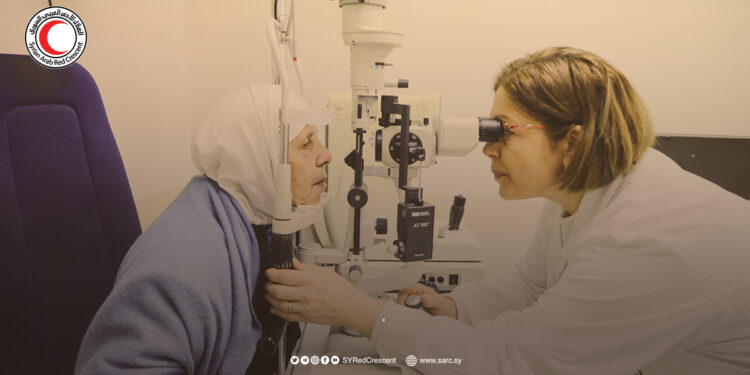Mariam travels about 6 kilometers from her home to get an examination with her spouse and some medication for treating asthma and heart disease. She waits for the Syrian Arab Red Crescent mobile clinic to visit Khan Arnaba in the countryside of Quneitra.
The sixty-year-old woman claims that if it weren’t for the clinic, she and her husband would have had to forgo necessities for the home or cease taking their expensive medications, as her husband’s pension does not cover the cost of these prescriptions.
Due to the high expenses of medical care and medication, as well as the precarious financial and humanitarian conditions that many families face as a result of crises, earthquake, and climate change, Mariam, like thousands of other families in Syria, is unable to pay for these necessities on her own. By offering medical assistance to those in need, the Syrian Arab Red Crescent aims to lessen some of these burdens through its clinics, dispensaries, and mobile teams.
In Al-Quneitra, the clinic makes sporadic visits to the villages of Al-Musherifa, Um Batna, Al-Sendyaniyah, Al-Hurriya, Taranja, and Khan Arnaba.
It sees roughly fifty patients daily, dispensing medication as needed.
The availability of health care is another obstacle that families must overcome because the crisis has damaged about half of the medical facilities. Therfore, a mobile children’s clinic provides medical services for kids in 13 rural Homs areas every morning. These services include examinations, medication, nebulization sessions, and other medical services.
The services provided by the Syrian Arab Red Crescent dispensary in Ikrimah, also in Homs, help families with some of their burdens. For the past six years, Suleiman has made monthly appointments to the SARC dispensary to monitor his blood pressure, diabetes, and cholesterol.
He says, “I cannot bear the burden of buying medicines whose prices increase every day.” His pension hardly covers any. It provides for his grandchildren’s needs, whom he has taken care of since their father passed away.
As Mutiaa mentioned, she is impatiently waiting for her twins. She is continuing her pregnancy in the seventh month without worrying about the costs of the examination, echo examination, or medications because Ikrima Clinic offers free examinations and medications in the internal medicine, children’s, and women’s clinics.
Mariam’s mother says, “I do not know how we would manage the medications and treatment for my five children if it were not for these services.” Mariam is an asthma patient.
The SARC dispensary in Qudsaya, rural Damascus, also offers free services in internal medicine, pediatrics, and women’s clinics, along with medications and basic laboratory testing. About 11,000 patients were seen there in August, September, and October of 2023, among them was 80-year-old Um Bashar, who travels 4 kilometers from her home. To get medical care, go to the dispensary.
As she puts it, Um Bashar supports her daughter and herself with a meager income and some help from her family.
The family’s circumstances have been impacted by the relocation and crisis circumstances, but, in her words, having Qudsaya clinic close to home made it simpler for her to get medical care without worrying about the expense.
There is also a mobile clinic in the eastern countryside of Deir Ezzor that serves the locals and responds to emergencies. For instance, during the September–November 2023 displacement crisis, the clinic provided medical care to 2,090 individuals, including the elderly and children.
It is noteworthy that the China International Development Cooperation Agency CIDCA, via the International Federation of Red Cross and Red Crescent Societies, currently supports the Syrian Arab Red Crescent in providing these services.


